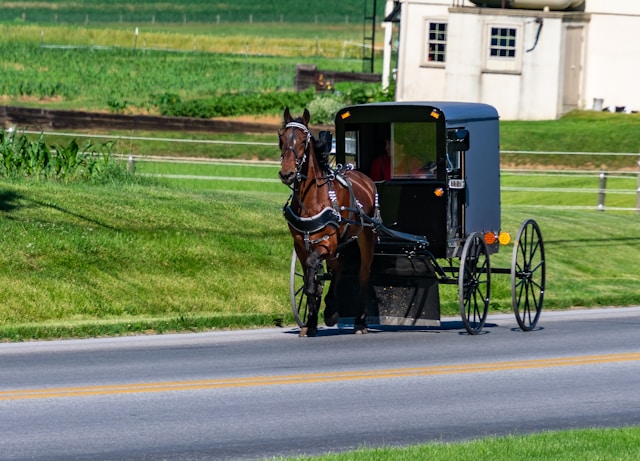Food rights and federalism clash in the MAHA era
Legal counsel for Amish food rights activist Amos Miller claimed victory in a recent Pennsylvania decision that permits the feisty farmer to continue selling his raw milk outside of the state but not “within the Commonwealth.” The ruling permits Miller to keep his business afloat to fight for food rights another day, but his war is far from over.
Stirring Up the Amish
On Jan. 5, 2024, Pennsylvania State Police and Department of Agriculture officials raided Miller’s farm on alleged complaints of illness caused by his raw milk sold in New York and Michigan. Authorities seized milk products and frozen meats, sparking nationwide backlash and seeding an unprecedented wave of pro-Donald Trump Amish votes among an agricultural community known for keeping to themselves.
Miller has fought state regulators for years, but the MAHA movement has converged with Americans seeking food liberties. In 2021, Maine became the first state to amend its constitution to enshrine the liberty to buy and eat food of one’s choosing; initiatives are growing in many states to follow suit. Some estimate that Miller’s out-of-state customer base is as high as 4,000 to 5,000. For purposes of the recent Pennsylvania appellate court ruling in his favor, the number of Miller’s customers was weightier than the number of bacteria in his milk.
The arcane legal posture of the case arises from the delicate state and federal boundaries of the US Constitution and resulted in a strange preliminary injunction whereby Miller and his affiliated businesses are free to sell raw milk and other uninspected food products to people in other states but not within the state of Pennsylvania. The decision hinges upon the state’s balancing test for injunctions.
A Large Caliber Complaint?
After seizing the Millers’ food products and filing a 357-page complaint, the State of Pennsylvania requested a preliminary injunction prohibiting the farm family from selling any raw milk pending the trial’s outcome. The trial court initially granted the state’s request but later amended its ruling to permit Miller and his wife Rebecca to sell raw milk outside the state’s boundaries (but not within) because of concerns that important constitutional rights were impacted.
The Millers argued an injunction prohibiting sales to customers outside Pennsylvania would violate the Supremacy Clause, the Commerce Clause, the Privileges and Immunities Clause, and the Right to Travel Clause of the US Constitution. The trial court agreed, fashioning its Solomonic injunction because it “decline[d] to blur the line between the regulation of raw milk sales in the Commonwealth and interstate commerce.”
Historically, the federal government is empowered by the US Constitution and the Supremacy Clause to regulate interstate commerce, including the sale of food. State governments retain authority to oversee the health and safety of food products and other commerce within state boundaries. The Pennsylvania raw milk statute even employs the phrase “within the Commonwealth,” and so the trial court limited the injunction to that jurisdictional (and geographical) demarcation pending a fuller consideration of the facts and law at trial.
Raw Milk Is Safe and Legal
The case does not address the safety of raw milk, which is legal in Pennsylvania, so long as a permit is obtained, which Miller asserts violates his religious liberties. Famous for their devout, humble lifestyles and stubborn resilience, the Pennsylvania Amish are also renowned for carving a protective constitutional “safe space” around their religious observances. In the seminal 1972 case of Wisconsin v. Yoder, the Amish won recognition of the liberty to withdraw their children from compulsory public school education past the eighth grade. The US Supreme Court ruled their fundamental rights to the free exercise of their faith outweighed the state’s interest in educating their children.
That precedent bears an interesting parallel to Miller’s current kerfuffle. In its Jan. 3, 2025, ruling, the Commonwealth Court of Pennsylvania balanced the potential economic harms to the Millers’ farming business against the state’s arguments of threats to public safety in determining whether a preliminary injunction should be issued. Agreeing with the lower court that important federal constitutional issues are raised that must be addressed at trial, the appellate court emphasized the Millers’ arguments alleging irrevocable harm:
“The Millers argue a preliminary injunction of their out-of-state raw milk sales would bankrupt them, cause them to lose their family farm, and effectively end the case before the trial court can decide the merits … On this issue, we find persuasive Watson v. Perdue, 410 F. Supp. 3d 122, 131 (D.D.C. 2019), recognizing loss of a family farm constitutes irreparable harm because ‘[i]t involves the loss of generations of family history, sweat-equity, and memories,’ and monetary damages are no substitute … The Department does not dispute a preliminary injunction would bankrupt the Millers, and it presented no evidence to the contrary during the evidentiary hearing.”
Amish Amos Fights for Food Rights
This is uncharted legal territory, though, for all American farmers and consumers. The infamous 1942 case of Wickard v. Filburn held that the federal government possessed the constitutional power to regulate a farmer’s wheat grown in his own fields and fed to his own livestock under the Commerce Clause of the US Constitution. Pennsylvania Department of Agriculture v. Miller is grappling with the issue of whether one state can regulate the commerce of another.
Each side argues the other’s position is absurd: The state asserts restricting its authority would allow people from other states to come there to produce uninspected goods to sell outside of Pennsylvania. The Millers posit that permitting the state’s interpretation would allow it to interfere with people traveling through the Commonwealth in possession of raw milk intended for other states, interfering with federal jurisdiction and federal rights to freedom of travel.
Miller will continue selling raw milk in other states pending his ongoing Pennsylvania court battles. If he prevails at trial, and the federal government declines to intrude between him and his trusting customers, he might keep selling uninspected raw milk out-of-state long after his cows come home.
